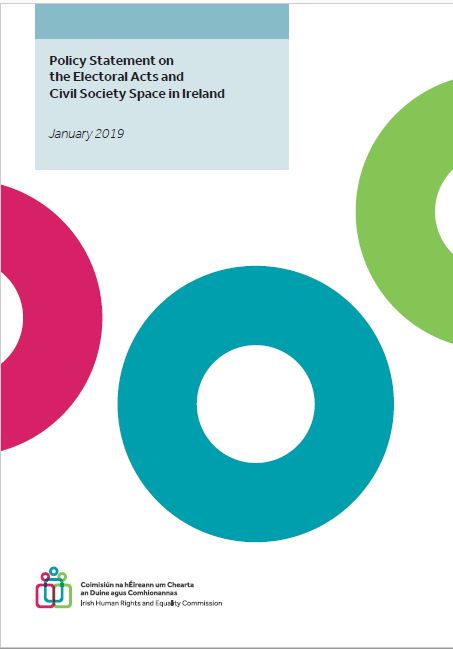The State must avoid undue restrictions on civil society organisations engaging in legitimate advocacy, the Irish Human Rights and Equality Commission (‘the Commission’) has stated today in a policy statement issued directly to Minister Eoghan Murphy T.D., Minister of State John Paul Phelan T.D. and Oireachtas Members.
The Commission has set out its recommendations in its role as Ireland’s National Human Rights and Equality body, in light of concerns that application of the 1997 Electoral Act (as amended) may be having a chilling effect on the funding and activities of civil society organisations involved in legitimate advocacy.
The Commission today sets out the need for a review of the Electoral Acts to:
- Consider how the State ensures an enabling legal framework and a conducive political and public environment for human rights defenders, enabling individuals, groups, civil society organisations and national institutions for the protection and promotion of human rights (NHRIs) to freely carry out activities, on a legal basis, consistent with international law and standards, to strive for the protection and promotion of all human rights and fundamental freedoms;
- Set out a clearer links between restrictions placed on ‘third party’ activity/ activity for ‘political purposes’ specific to elections and referendums, rather than wider civil society activity aiming to influence policy making and decision making.
- Take account of wider reforms now underway in oversight of electoral processes around the development of a statutory Electoral Commission.
The Commission points to concerns raised in 2003 regarding the wide scope of the legislation by the Standards in Public Office Commission (SIPO), and more recently in 2018 by the EU’s Fundamental Rights Agency. November 2018 also saw the Council of Europe call on all its Member States, including Ireland, to strengthen the protection and promotion of civil society space in Europe.
The Commission stresses the protections afforded to freedom of association in the Irish Constitution, and in the various international human rights treaties to which Ireland is a party. It also notes the significant emphasis Ireland has placed on promoting the role of civil society internationally in its foreign policy, including during its membership of the United Nations Human Rights Council.
The Commission is also following closely proposals, now under public consultation, to establish an Electoral Commission and related provisions around the regulation of political funding, advertising and expenditure.
Emily Logan, Chief Commissioner of the Irish Human Rights and Equality Commission stated:
“Regulation, accountability and transparency in relation to elections and referendums are crucially important to the integrity of our democracy. However, the Commission is concerned that the current legislation may serve to undermine the legitimate advocacy work and activity of civil society groups, whose work is also at the heart of our democracy.
“Repressive measures are increasingly being used in Europe and globally to shrink the space in which human rights organisations can function. Ireland must not, through an unintended consequence of legislative change, give succour to this kind of approach and must instead seek to protect the rights of those who face the greatest barriers to justice.
“Ireland has a strong international reputation as a champion of civil society, having led two UN Human Rights Council resolutions affirming the critical role of civil society actors globally. Here at home we must respect those same fundamental freedoms that support the legitimate work of civil society actors.”
ENDS
For further information, please contact:
Brian Dawson, IHREC Communications Manager,
01 8589601 / 087 0697095
Follow us on twitter @_IHREC
Editor’s Note
The policy statement from the Irish Human Rights and Equality Commission is available at the following link:
The Commission is mandated to keep under review the adequacy and effectiveness of law and practice in the State relating to the protection of human rights and equality and to make recommendations to the Government to strengthen and uphold human rights and equality in the State.
Irish Human Rights and Equality Commission
The Irish Human Rights and Equality Commission is an independent public body, appointed by the President and directly accountable to the Oireachtas. The Commission has a statutory remit set out under the Irish Human Rights and Equality Commission Act (2014) to protect and promote human rights and equality in Ireland, and build a culture of respect for human rights, equality and intercultural understanding in the State.
The Irish Human Rights and Equality Commission is Ireland’s national human rights institution and is recognised as such by the United Nations. The Commission is also Ireland’s national equality body for the purpose of a range of EU anti-discrimination measures.
